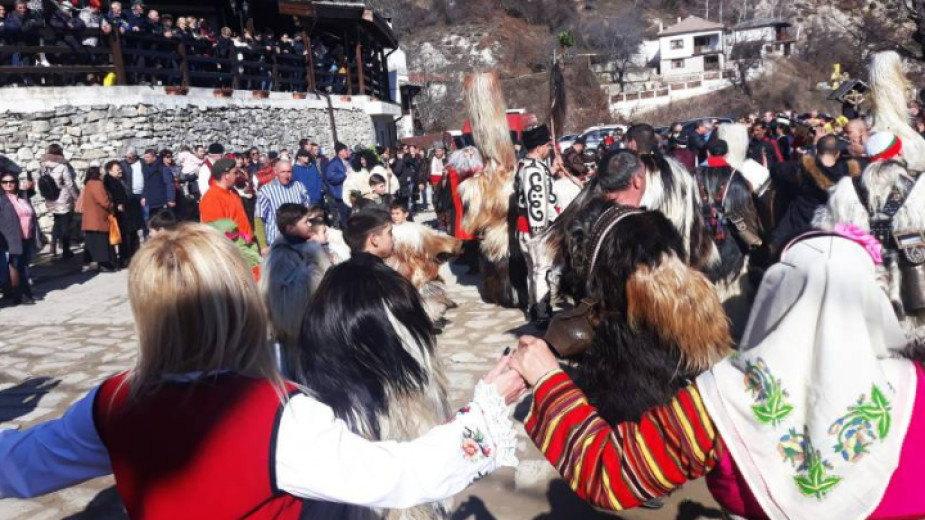Wine will spout from two drinking fountains over the weekend in Delchevo. Perched on top of the mountain, the village located close to Gotse Delchev, has made a name for itself as a tourist attraction with its ancient architecture and the beautiful views of Mounts Pirin and the Rhodopes. Delchevo is rich in traditions, and the most popular among them is the wine festival which presents one of the oldest occupations in these parts – wine making.
This year the festival will be held on 3 and 4 February, right in between the day of St. Trifon on 1 February and Trifon Zarezan, old style – 14 February, the day on which vine growers and wine makers celebrate.

The start will be given with a reenactment of “Scaring the bear away from the vineyards” with the participation of the kukeri group from Musomishte. Then comes the moment awaited most eagerly by wine lovers – the competition for top wine and rakia producer. By a tradition, participants from the neighbouring Greek municipalities – Drama, Kavala, Kato Nevrokopi, Prosotsani – also take part in the contest.
“They are mostly amateurs, not professionals, and they come from Bulgaria as well as from Northern Greece,” says Delchevo’s deputy mayor Ivan Panayotov in an interview with Radio Bulgaria. “Typically, around 120-150 samples (wine and rakia) take part in the contest from the region of Gotse Delchev, but also from the regions of Drama, Kavala and other parts of Northern Greece. This year we have samples form Sofia, Blagoevgrad and Melnik. The contestants are people who make their own wine and want to take part in our contest because they believe their wine is the best. The competition is completely anonymous, and the commission is impartial, consisting of 20 members – mostly oenologists, agronomists etc. from Bulgaria and Greece.” 
The tasting of the wines and rakias taking part in the contest will be at 12 noon in Delchovski inn on 3 February. The highlight of the festival will be on Sunday, 4 February, when everyone will go to the vineyards in Baira locality near the village, where the first ritual pruning of the vines and pouring of wine will take place. By a tradition, some 150-200 people, clad in national costumes, will take part in the ritual which attracts a big crowd from the entire region, but also from the neighbouring Greek municipalities.
At every wine festival in Declhevo there is a reenactment “Dragon wedding”. According to a local legend, a dragon once stole the most beautiful maiden of the village, and ever since, he has been protecting the village from evil forces, and people have honoured him with such reenactments. The festival programme will include folk groups from the nearby villages of Musomishte, Banichan, Ablanitsa, as well as the dance formation Gaitani from Sofia. “We are expecting confirmation by a group of bagpipe players from the neighbouring Greek village Kali Vrisi that they will join our festival,” Ivan Panayotov says. 
There are several typically old-style guest houses in Delchevo which offer all modern conveniences, as well as three restaurants and two eco trails which, even now in wintertime, are passable and lead up to magnificent parts of the mountain, says Delchevo’s deputy mayor.
“One of the eco trails starts from Delchevo and reaches Delchovski meadows. It is the best one to follow because it is less travelled, it is level and takes about 45 minutes in one direction. The other trail is an extreme climb up to St. Kostadin peak. There is a chapel on top, and it takes about an hour and a half in one direction. St. Kostadin peak commands a spectacular view of Nevrokop plain, including of the Rhodopes and all villages scattered on its slopes,” Ivan Panayotov says.
More:
Translated and posted by Milena Daynova
Photos: Gotse Delchev municipality, BGNES-archive, grab YouTube /WebMarker
On 22 November, the Association of Bulgarian Folk Ensembles Abroad (ABFEA) will present its project, 'Online Catalogue of Bulgarian Horo and Other Dances', in three European cities: Lyon, Munich and Copenhagen. 'Our goal is to preserve Bulgarian..
‘The Bulgarian horo is a kind of magic — an enchanted circle that pulses with the unique energy of our spirit, our traditions and our identity,’ says journalist Milena Milotinova, who recently presented her new documentary The Magic of the Bulgarian..
The Eastern Rhodopes come to life in the heart of Sofia – with authentic flavoуrs, music and craftsmanship . Residents of the Bulgaria capital have a chance to immerse themselves in the atmosphere of Momchilgrad Municipality and its cultural and natural..

+359 2 9336 661
